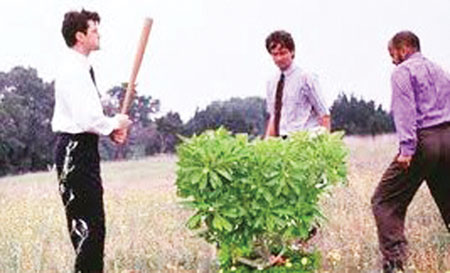
11. The Best Of Both Worlds
The phrase “the best of both worlds” refers to an item or situation that offers the benefits of two disparate or competing items or situations, often without presenting the undesirable aspects of either. To make a long story short, it means that you can enjoy two different opportunities at the same time. Even though the exact origins of the term are unconfirmed, the phrase has been a part of English since at least the late 1800s. It is believed to have derived from the saying “the best of all possible worlds,” which was used in Voltaire’s novella Candide, published in 1759, but the modern definition of the idiom usually compares only two situations as opposed to the broader comparison implied by Voltaire.

12. Break A Leg
This really weird-sounding idiom is mainly used when you want to wish someone good luck and it was first used by stage actors who were known for being very superstitious. Although there are many different theories about the origin of “break a leg” and no one can be one hundred percent sure, the most accepted theory today suggests that “break a leg” was heard for the first time in British theater circles back in the 1920s.

13. An Apple A Day Keeps The Doctor Away
Was this catchy rhyme a proverb from Pembrokeshire, or Devon? The earliest recording of the phrase in 1866, states “Eat an apple on going to bed, And you’ll keep the doctor from earning his bread” is from the former. But in 1913, Elizabeth Wright recorded this phrase from the latter: “Ait a happleavoregwain to bed, An’ you’ll make the doctor beg his bread; or as the more popular version runs: An apple a day Keeps the doctor away.
14. Cool as a cucumber
Despite sounding like a modern-day phrase, Cool as a cucumber actually first appeared in John Gay’s Poems, New Song on New Similies, in 1732: “I … cool as a cucumber could see The rest of womankind.”
15. Busy As A Bee
Chaucer coined the term in the Squire’s Tale, from his Canterbury Tales, around 1386-1400.
16. Bring Home The Bacon
This phrase is often attributed to the story of Dunmow Flitch. In 1104, a couple in Great Dunmow, Essex, impressed the Prior of Little Dunmow with their love and devotion so much, that he awarded them a flitch [a side] of bacon.
17. Basket Case
Originally, this term was used by the US military after WWI, referring to soldiers who had lost arms and legs and had to be carried by others.

18. Beat Around The Bush
Beat around the bush evolved from “beat about the bush”, a term used in bird hunting to rouse the prey out of the bushes, and into nets. Grouse hunters still use beaters today.

19. Two Peas In A Pod
Referring to the fact that two peas in a pod are identical,this phrase dates from the 16th century, and appeared in John Lyly’s Euphues and his England, in 1580: “Wherin I am not unlike unto the unskillful Painter, who having drawen the Twinnes of Hippocrates, (who wer as lyke as one pease is to an other).”
20. A Man After My Own Heart
This saying comes from the Bible (King James Version): Samuel 13:14: “But now thy kingdom shall not continue: the LORD hath sought him a man after his own heart, and the LORD hath commanded him to be captain over his people, because thou hast not kept that which the LORD commanded thee.”

